The Ideals of Communism: Mao Zedong's Efforts to Refurbish China
VerifiedAdded on 2023/06/04
|9
|2138
|293
Essay
AI Summary
This essay examines Mao Zedong's efforts to transform China in the mid-20th century, focusing on his communist ideals and their impact on the nation's social, political, and economic landscape. It discusses the violence and instability preceding Mao's rise to power, his political objectives and guerilla tactics, and the economic challenges China faced after 1949, including food shortages and inflation. The essay also evaluates Mao's attempts to create a new society, highlighting both his successes in building an independent economy and improving living standards, as well as his mistakes and the external pressures from the United States and the Soviet Union. It concludes that while Mao's leadership was instrumental in guiding China towards independence, his ideals were not always effectively implemented.
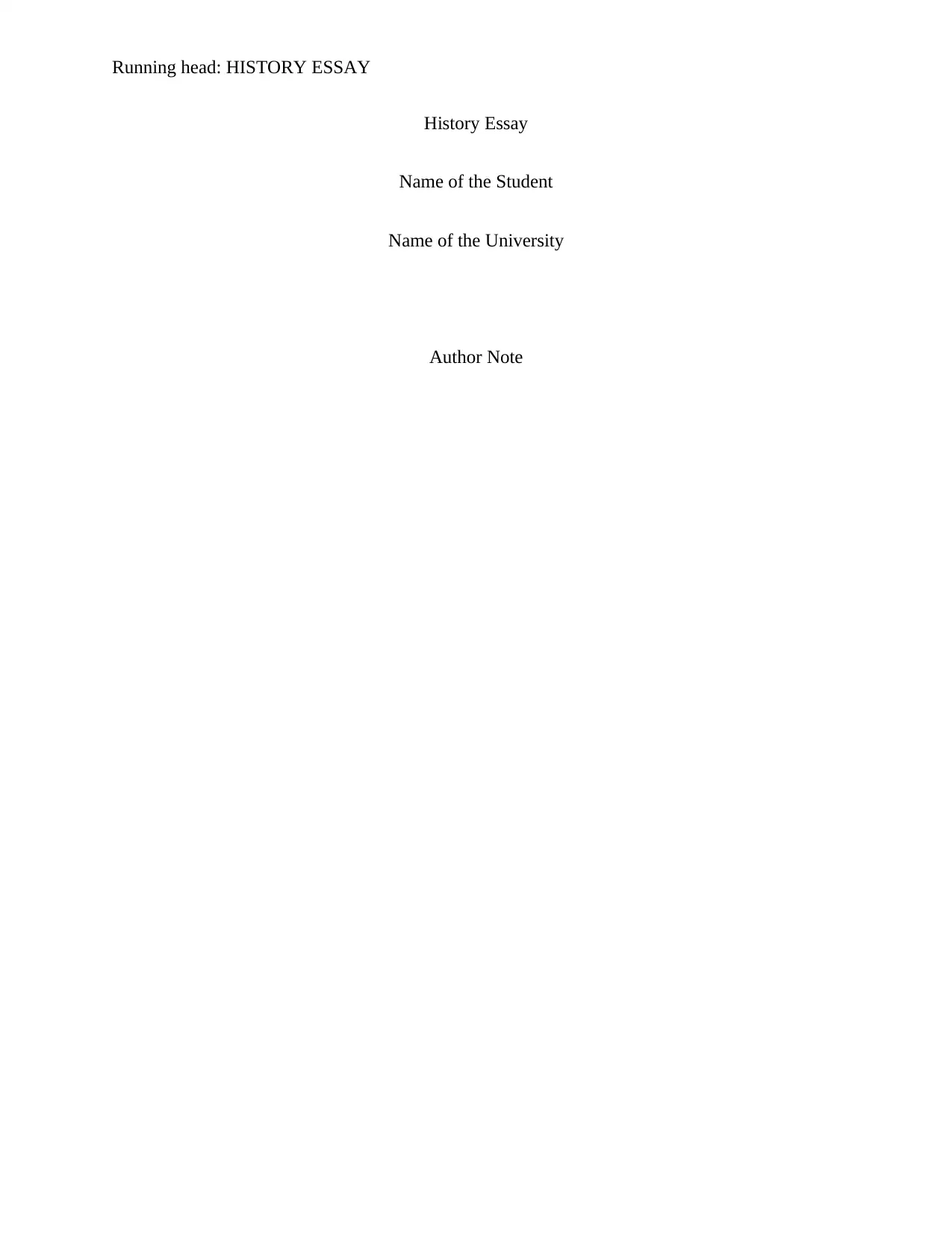
Running head: HISTORY ESSAY
History Essay
Name of the Student
Name of the University
Author Note
History Essay
Name of the Student
Name of the University
Author Note
Paraphrase This Document
Need a fresh take? Get an instant paraphrase of this document with our AI Paraphraser
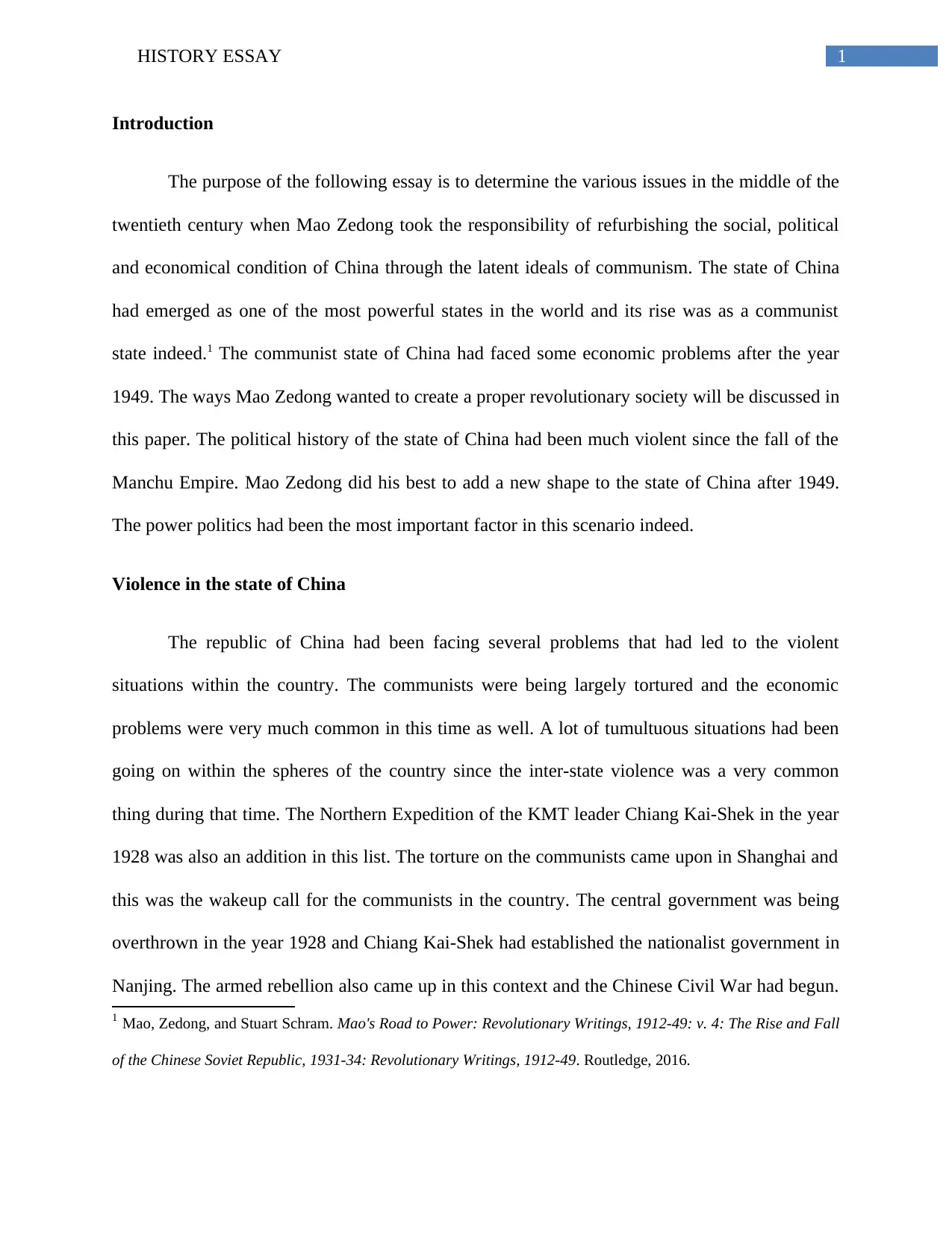
1HISTORY ESSAY
Introduction
The purpose of the following essay is to determine the various issues in the middle of the
twentieth century when Mao Zedong took the responsibility of refurbishing the social, political
and economical condition of China through the latent ideals of communism. The state of China
had emerged as one of the most powerful states in the world and its rise was as a communist
state indeed.1 The communist state of China had faced some economic problems after the year
1949. The ways Mao Zedong wanted to create a proper revolutionary society will be discussed in
this paper. The political history of the state of China had been much violent since the fall of the
Manchu Empire. Mao Zedong did his best to add a new shape to the state of China after 1949.
The power politics had been the most important factor in this scenario indeed.
Violence in the state of China
The republic of China had been facing several problems that had led to the violent
situations within the country. The communists were being largely tortured and the economic
problems were very much common in this time as well. A lot of tumultuous situations had been
going on within the spheres of the country since the inter-state violence was a very common
thing during that time. The Northern Expedition of the KMT leader Chiang Kai-Shek in the year
1928 was also an addition in this list. The torture on the communists came upon in Shanghai and
this was the wakeup call for the communists in the country. The central government was being
overthrown in the year 1928 and Chiang Kai-Shek had established the nationalist government in
Nanjing. The armed rebellion also came up in this context and the Chinese Civil War had begun.
1 Mao, Zedong, and Stuart Schram. Mao's Road to Power: Revolutionary Writings, 1912-49: v. 4: The Rise and Fall
of the Chinese Soviet Republic, 1931-34: Revolutionary Writings, 1912-49. Routledge, 2016.
Introduction
The purpose of the following essay is to determine the various issues in the middle of the
twentieth century when Mao Zedong took the responsibility of refurbishing the social, political
and economical condition of China through the latent ideals of communism. The state of China
had emerged as one of the most powerful states in the world and its rise was as a communist
state indeed.1 The communist state of China had faced some economic problems after the year
1949. The ways Mao Zedong wanted to create a proper revolutionary society will be discussed in
this paper. The political history of the state of China had been much violent since the fall of the
Manchu Empire. Mao Zedong did his best to add a new shape to the state of China after 1949.
The power politics had been the most important factor in this scenario indeed.
Violence in the state of China
The republic of China had been facing several problems that had led to the violent
situations within the country. The communists were being largely tortured and the economic
problems were very much common in this time as well. A lot of tumultuous situations had been
going on within the spheres of the country since the inter-state violence was a very common
thing during that time. The Northern Expedition of the KMT leader Chiang Kai-Shek in the year
1928 was also an addition in this list. The torture on the communists came upon in Shanghai and
this was the wakeup call for the communists in the country. The central government was being
overthrown in the year 1928 and Chiang Kai-Shek had established the nationalist government in
Nanjing. The armed rebellion also came up in this context and the Chinese Civil War had begun.
1 Mao, Zedong, and Stuart Schram. Mao's Road to Power: Revolutionary Writings, 1912-49: v. 4: The Rise and Fall
of the Chinese Soviet Republic, 1931-34: Revolutionary Writings, 1912-49. Routledge, 2016.
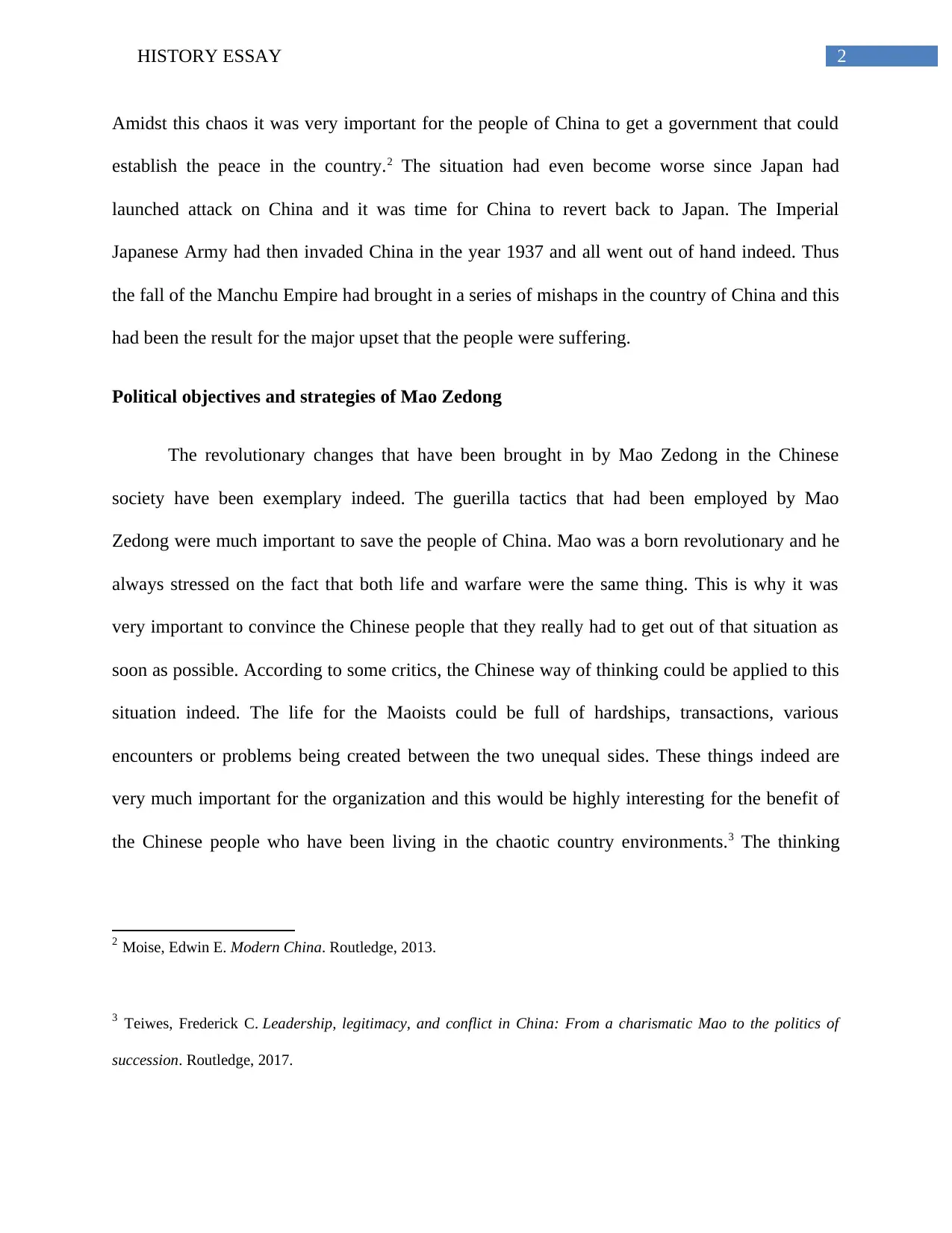
2HISTORY ESSAY
Amidst this chaos it was very important for the people of China to get a government that could
establish the peace in the country.2 The situation had even become worse since Japan had
launched attack on China and it was time for China to revert back to Japan. The Imperial
Japanese Army had then invaded China in the year 1937 and all went out of hand indeed. Thus
the fall of the Manchu Empire had brought in a series of mishaps in the country of China and this
had been the result for the major upset that the people were suffering.
Political objectives and strategies of Mao Zedong
The revolutionary changes that have been brought in by Mao Zedong in the Chinese
society have been exemplary indeed. The guerilla tactics that had been employed by Mao
Zedong were much important to save the people of China. Mao was a born revolutionary and he
always stressed on the fact that both life and warfare were the same thing. This is why it was
very important to convince the Chinese people that they really had to get out of that situation as
soon as possible. According to some critics, the Chinese way of thinking could be applied to this
situation indeed. The life for the Maoists could be full of hardships, transactions, various
encounters or problems being created between the two unequal sides. These things indeed are
very much important for the organization and this would be highly interesting for the benefit of
the Chinese people who have been living in the chaotic country environments.3 The thinking
2 Moise, Edwin E. Modern China. Routledge, 2013.
3 Teiwes, Frederick C. Leadership, legitimacy, and conflict in China: From a charismatic Mao to the politics of
succession. Routledge, 2017.
Amidst this chaos it was very important for the people of China to get a government that could
establish the peace in the country.2 The situation had even become worse since Japan had
launched attack on China and it was time for China to revert back to Japan. The Imperial
Japanese Army had then invaded China in the year 1937 and all went out of hand indeed. Thus
the fall of the Manchu Empire had brought in a series of mishaps in the country of China and this
had been the result for the major upset that the people were suffering.
Political objectives and strategies of Mao Zedong
The revolutionary changes that have been brought in by Mao Zedong in the Chinese
society have been exemplary indeed. The guerilla tactics that had been employed by Mao
Zedong were much important to save the people of China. Mao was a born revolutionary and he
always stressed on the fact that both life and warfare were the same thing. This is why it was
very important to convince the Chinese people that they really had to get out of that situation as
soon as possible. According to some critics, the Chinese way of thinking could be applied to this
situation indeed. The life for the Maoists could be full of hardships, transactions, various
encounters or problems being created between the two unequal sides. These things indeed are
very much important for the organization and this would be highly interesting for the benefit of
the Chinese people who have been living in the chaotic country environments.3 The thinking
2 Moise, Edwin E. Modern China. Routledge, 2013.
3 Teiwes, Frederick C. Leadership, legitimacy, and conflict in China: From a charismatic Mao to the politics of
succession. Routledge, 2017.
⊘ This is a preview!⊘
Do you want full access?
Subscribe today to unlock all pages.

Trusted by 1+ million students worldwide
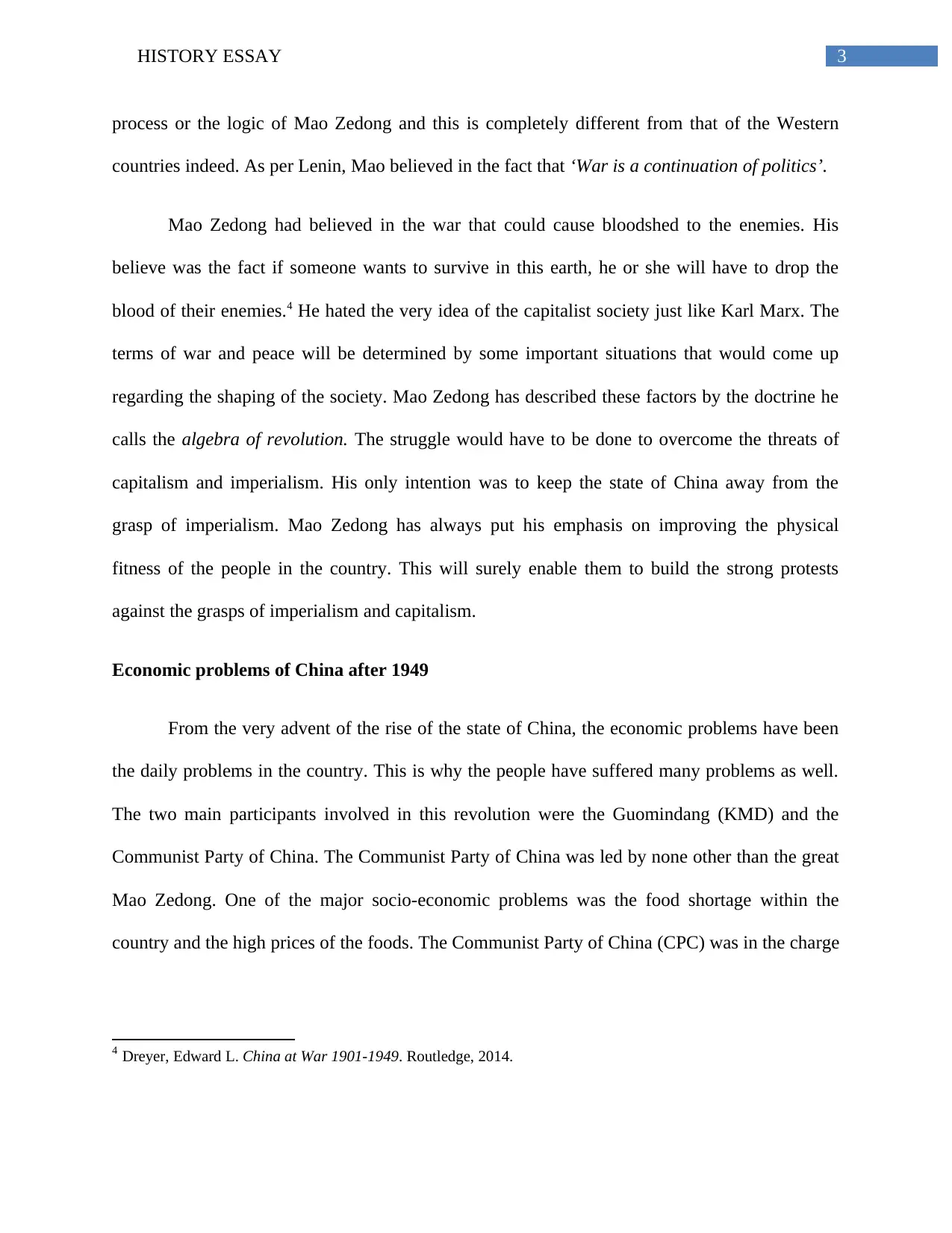
3HISTORY ESSAY
process or the logic of Mao Zedong and this is completely different from that of the Western
countries indeed. As per Lenin, Mao believed in the fact that ‘War is a continuation of politics’.
Mao Zedong had believed in the war that could cause bloodshed to the enemies. His
believe was the fact if someone wants to survive in this earth, he or she will have to drop the
blood of their enemies.4 He hated the very idea of the capitalist society just like Karl Marx. The
terms of war and peace will be determined by some important situations that would come up
regarding the shaping of the society. Mao Zedong has described these factors by the doctrine he
calls the algebra of revolution. The struggle would have to be done to overcome the threats of
capitalism and imperialism. His only intention was to keep the state of China away from the
grasp of imperialism. Mao Zedong has always put his emphasis on improving the physical
fitness of the people in the country. This will surely enable them to build the strong protests
against the grasps of imperialism and capitalism.
Economic problems of China after 1949
From the very advent of the rise of the state of China, the economic problems have been
the daily problems in the country. This is why the people have suffered many problems as well.
The two main participants involved in this revolution were the Guomindang (KMD) and the
Communist Party of China. The Communist Party of China was led by none other than the great
Mao Zedong. One of the major socio-economic problems was the food shortage within the
country and the high prices of the foods. The Communist Party of China (CPC) was in the charge
4 Dreyer, Edward L. China at War 1901-1949. Routledge, 2014.
process or the logic of Mao Zedong and this is completely different from that of the Western
countries indeed. As per Lenin, Mao believed in the fact that ‘War is a continuation of politics’.
Mao Zedong had believed in the war that could cause bloodshed to the enemies. His
believe was the fact if someone wants to survive in this earth, he or she will have to drop the
blood of their enemies.4 He hated the very idea of the capitalist society just like Karl Marx. The
terms of war and peace will be determined by some important situations that would come up
regarding the shaping of the society. Mao Zedong has described these factors by the doctrine he
calls the algebra of revolution. The struggle would have to be done to overcome the threats of
capitalism and imperialism. His only intention was to keep the state of China away from the
grasp of imperialism. Mao Zedong has always put his emphasis on improving the physical
fitness of the people in the country. This will surely enable them to build the strong protests
against the grasps of imperialism and capitalism.
Economic problems of China after 1949
From the very advent of the rise of the state of China, the economic problems have been
the daily problems in the country. This is why the people have suffered many problems as well.
The two main participants involved in this revolution were the Guomindang (KMD) and the
Communist Party of China. The Communist Party of China was led by none other than the great
Mao Zedong. One of the major socio-economic problems was the food shortage within the
country and the high prices of the foods. The Communist Party of China (CPC) was in the charge
4 Dreyer, Edward L. China at War 1901-1949. Routledge, 2014.
Paraphrase This Document
Need a fresh take? Get an instant paraphrase of this document with our AI Paraphraser
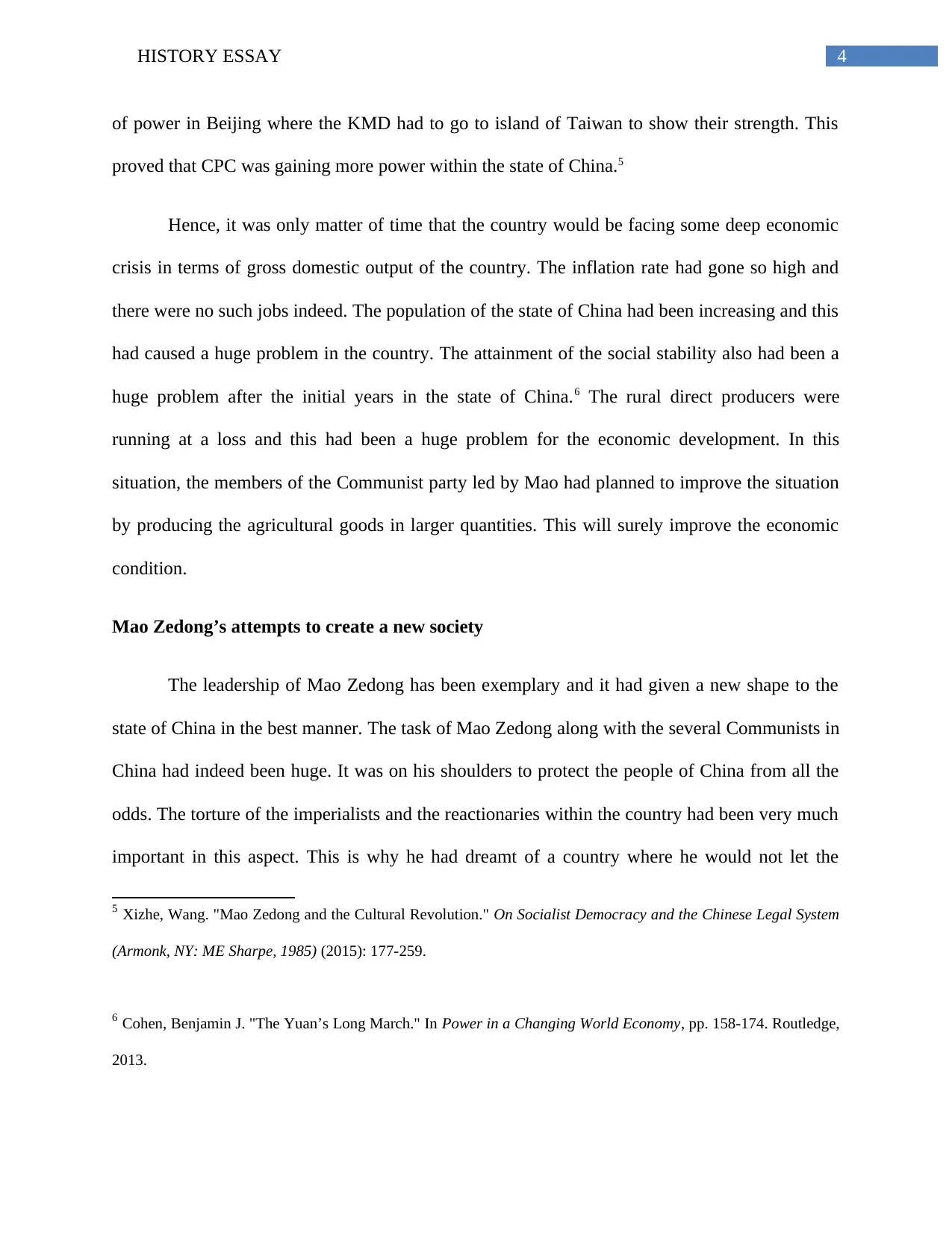
4HISTORY ESSAY
of power in Beijing where the KMD had to go to island of Taiwan to show their strength. This
proved that CPC was gaining more power within the state of China.5
Hence, it was only matter of time that the country would be facing some deep economic
crisis in terms of gross domestic output of the country. The inflation rate had gone so high and
there were no such jobs indeed. The population of the state of China had been increasing and this
had caused a huge problem in the country. The attainment of the social stability also had been a
huge problem after the initial years in the state of China.6 The rural direct producers were
running at a loss and this had been a huge problem for the economic development. In this
situation, the members of the Communist party led by Mao had planned to improve the situation
by producing the agricultural goods in larger quantities. This will surely improve the economic
condition.
Mao Zedong’s attempts to create a new society
The leadership of Mao Zedong has been exemplary and it had given a new shape to the
state of China in the best manner. The task of Mao Zedong along with the several Communists in
China had indeed been huge. It was on his shoulders to protect the people of China from all the
odds. The torture of the imperialists and the reactionaries within the country had been very much
important in this aspect. This is why he had dreamt of a country where he would not let the
5 Xizhe, Wang. "Mao Zedong and the Cultural Revolution." On Socialist Democracy and the Chinese Legal System
(Armonk, NY: ME Sharpe, 1985) (2015): 177-259.
6 Cohen, Benjamin J. "The Yuan’s Long March." In Power in a Changing World Economy, pp. 158-174. Routledge,
2013.
of power in Beijing where the KMD had to go to island of Taiwan to show their strength. This
proved that CPC was gaining more power within the state of China.5
Hence, it was only matter of time that the country would be facing some deep economic
crisis in terms of gross domestic output of the country. The inflation rate had gone so high and
there were no such jobs indeed. The population of the state of China had been increasing and this
had caused a huge problem in the country. The attainment of the social stability also had been a
huge problem after the initial years in the state of China.6 The rural direct producers were
running at a loss and this had been a huge problem for the economic development. In this
situation, the members of the Communist party led by Mao had planned to improve the situation
by producing the agricultural goods in larger quantities. This will surely improve the economic
condition.
Mao Zedong’s attempts to create a new society
The leadership of Mao Zedong has been exemplary and it had given a new shape to the
state of China in the best manner. The task of Mao Zedong along with the several Communists in
China had indeed been huge. It was on his shoulders to protect the people of China from all the
odds. The torture of the imperialists and the reactionaries within the country had been very much
important in this aspect. This is why he had dreamt of a country where he would not let the
5 Xizhe, Wang. "Mao Zedong and the Cultural Revolution." On Socialist Democracy and the Chinese Legal System
(Armonk, NY: ME Sharpe, 1985) (2015): 177-259.
6 Cohen, Benjamin J. "The Yuan’s Long March." In Power in a Changing World Economy, pp. 158-174. Routledge,
2013.
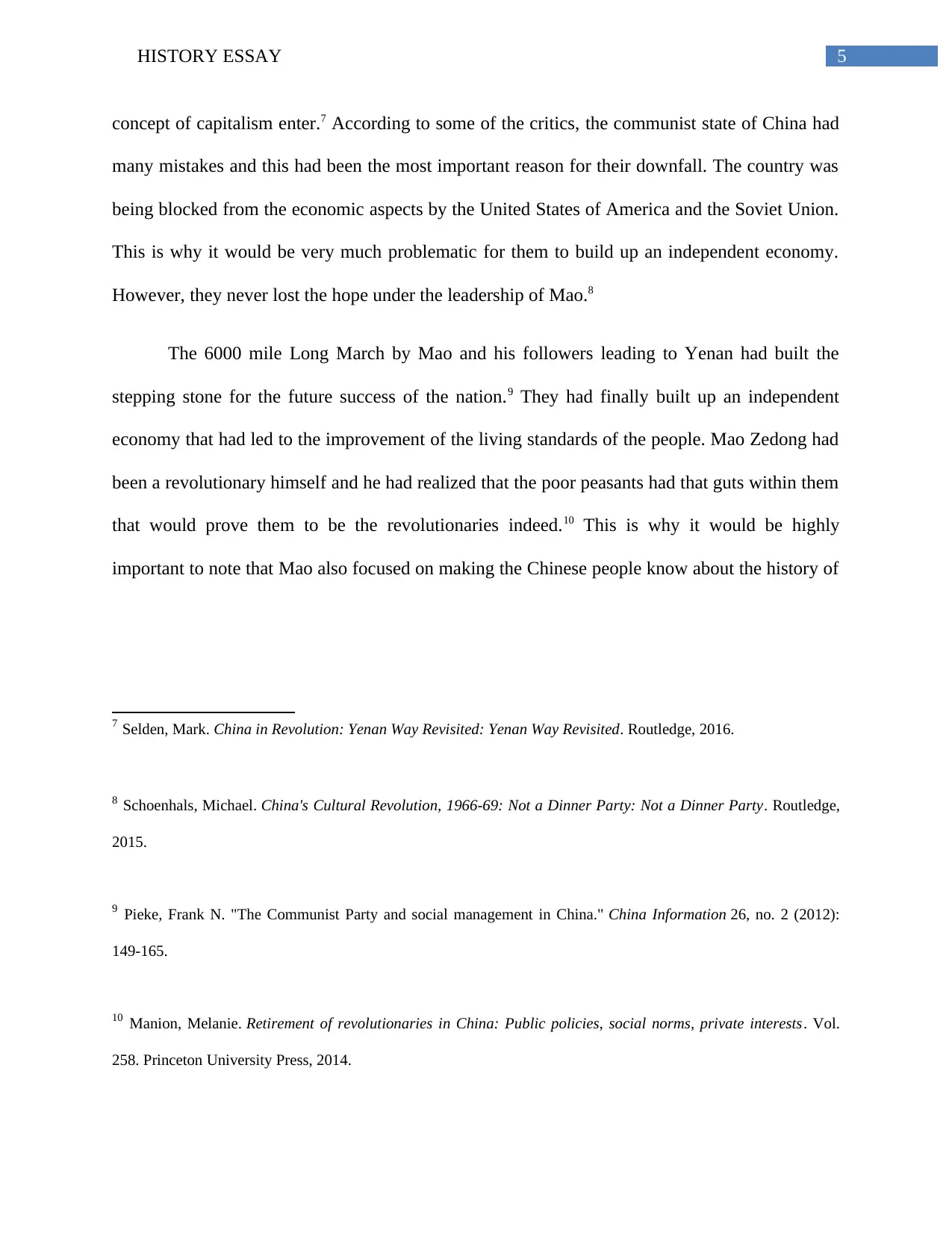
5HISTORY ESSAY
concept of capitalism enter.7 According to some of the critics, the communist state of China had
many mistakes and this had been the most important reason for their downfall. The country was
being blocked from the economic aspects by the United States of America and the Soviet Union.
This is why it would be very much problematic for them to build up an independent economy.
However, they never lost the hope under the leadership of Mao.8
The 6000 mile Long March by Mao and his followers leading to Yenan had built the
stepping stone for the future success of the nation.9 They had finally built up an independent
economy that had led to the improvement of the living standards of the people. Mao Zedong had
been a revolutionary himself and he had realized that the poor peasants had that guts within them
that would prove them to be the revolutionaries indeed.10 This is why it would be highly
important to note that Mao also focused on making the Chinese people know about the history of
7 Selden, Mark. China in Revolution: Yenan Way Revisited: Yenan Way Revisited. Routledge, 2016.
8 Schoenhals, Michael. China's Cultural Revolution, 1966-69: Not a Dinner Party: Not a Dinner Party. Routledge,
2015.
9 Pieke, Frank N. "The Communist Party and social management in China." China Information 26, no. 2 (2012):
149-165.
10 Manion, Melanie. Retirement of revolutionaries in China: Public policies, social norms, private interests. Vol.
258. Princeton University Press, 2014.
concept of capitalism enter.7 According to some of the critics, the communist state of China had
many mistakes and this had been the most important reason for their downfall. The country was
being blocked from the economic aspects by the United States of America and the Soviet Union.
This is why it would be very much problematic for them to build up an independent economy.
However, they never lost the hope under the leadership of Mao.8
The 6000 mile Long March by Mao and his followers leading to Yenan had built the
stepping stone for the future success of the nation.9 They had finally built up an independent
economy that had led to the improvement of the living standards of the people. Mao Zedong had
been a revolutionary himself and he had realized that the poor peasants had that guts within them
that would prove them to be the revolutionaries indeed.10 This is why it would be highly
important to note that Mao also focused on making the Chinese people know about the history of
7 Selden, Mark. China in Revolution: Yenan Way Revisited: Yenan Way Revisited. Routledge, 2016.
8 Schoenhals, Michael. China's Cultural Revolution, 1966-69: Not a Dinner Party: Not a Dinner Party. Routledge,
2015.
9 Pieke, Frank N. "The Communist Party and social management in China." China Information 26, no. 2 (2012):
149-165.
10 Manion, Melanie. Retirement of revolutionaries in China: Public policies, social norms, private interests. Vol.
258. Princeton University Press, 2014.
⊘ This is a preview!⊘
Do you want full access?
Subscribe today to unlock all pages.

Trusted by 1+ million students worldwide
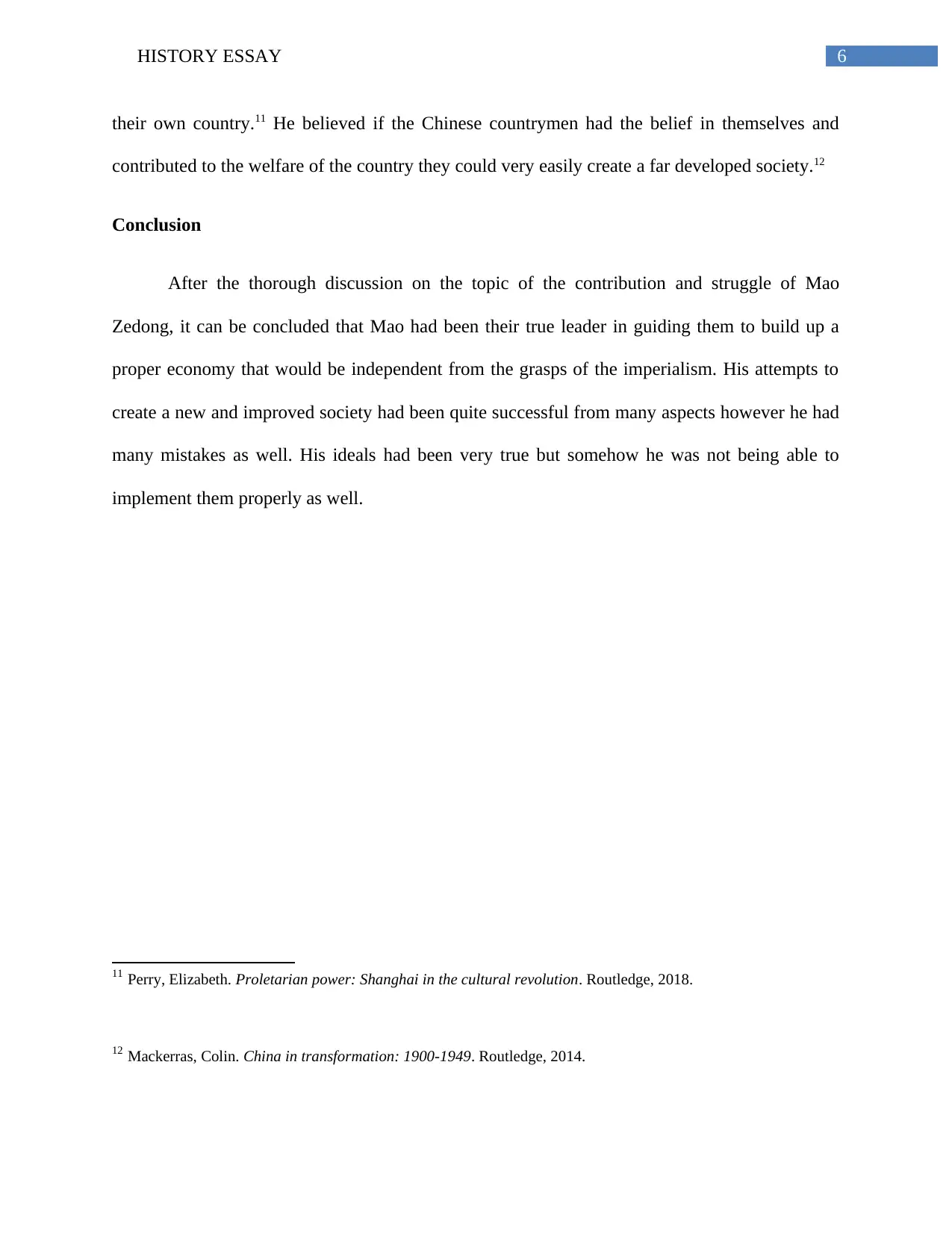
6HISTORY ESSAY
their own country.11 He believed if the Chinese countrymen had the belief in themselves and
contributed to the welfare of the country they could very easily create a far developed society.12
Conclusion
After the thorough discussion on the topic of the contribution and struggle of Mao
Zedong, it can be concluded that Mao had been their true leader in guiding them to build up a
proper economy that would be independent from the grasps of the imperialism. His attempts to
create a new and improved society had been quite successful from many aspects however he had
many mistakes as well. His ideals had been very true but somehow he was not being able to
implement them properly as well.
11 Perry, Elizabeth. Proletarian power: Shanghai in the cultural revolution. Routledge, 2018.
12 Mackerras, Colin. China in transformation: 1900-1949. Routledge, 2014.
their own country.11 He believed if the Chinese countrymen had the belief in themselves and
contributed to the welfare of the country they could very easily create a far developed society.12
Conclusion
After the thorough discussion on the topic of the contribution and struggle of Mao
Zedong, it can be concluded that Mao had been their true leader in guiding them to build up a
proper economy that would be independent from the grasps of the imperialism. His attempts to
create a new and improved society had been quite successful from many aspects however he had
many mistakes as well. His ideals had been very true but somehow he was not being able to
implement them properly as well.
11 Perry, Elizabeth. Proletarian power: Shanghai in the cultural revolution. Routledge, 2018.
12 Mackerras, Colin. China in transformation: 1900-1949. Routledge, 2014.
Paraphrase This Document
Need a fresh take? Get an instant paraphrase of this document with our AI Paraphraser
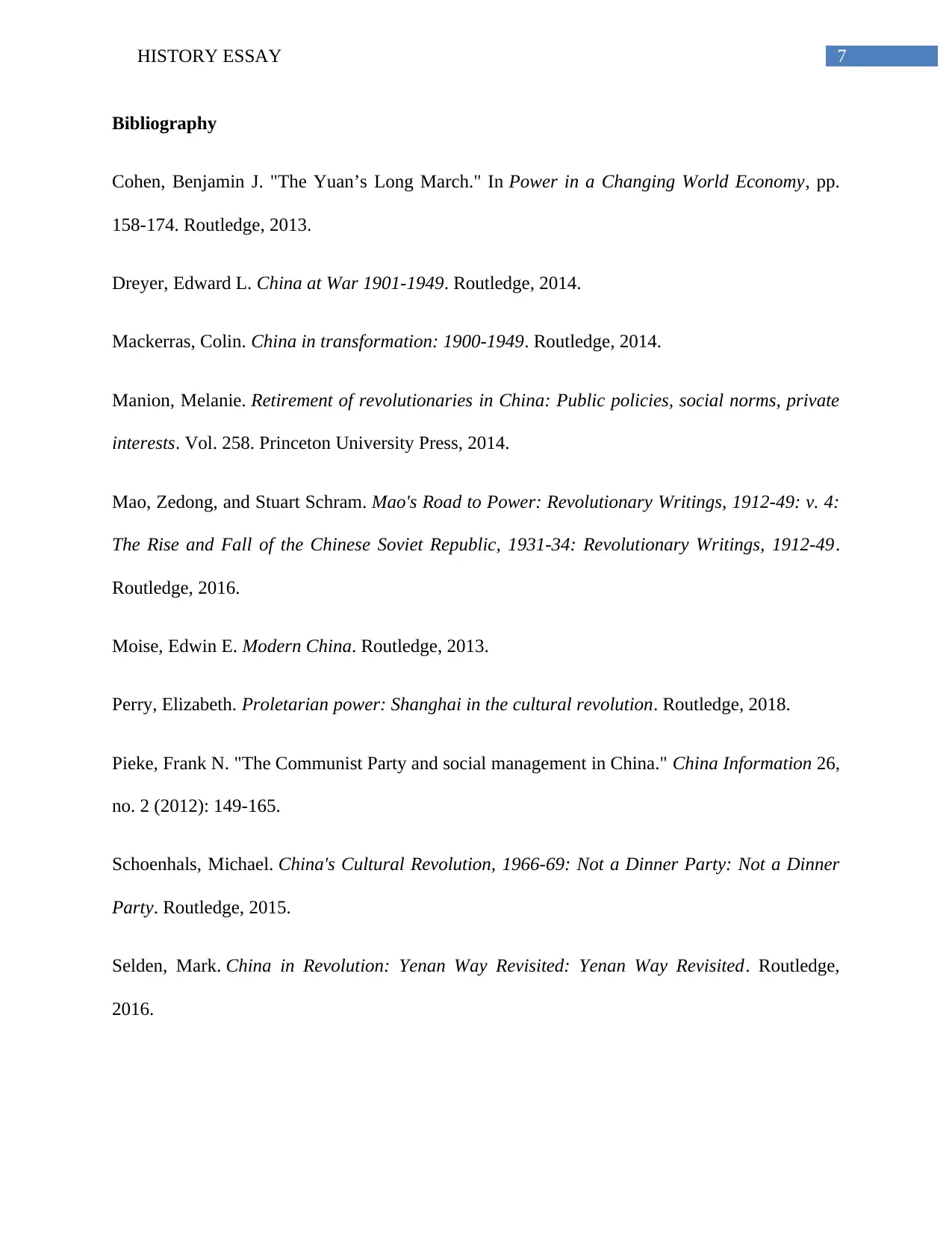
7HISTORY ESSAY
Bibliography
Cohen, Benjamin J. "The Yuan’s Long March." In Power in a Changing World Economy, pp.
158-174. Routledge, 2013.
Dreyer, Edward L. China at War 1901-1949. Routledge, 2014.
Mackerras, Colin. China in transformation: 1900-1949. Routledge, 2014.
Manion, Melanie. Retirement of revolutionaries in China: Public policies, social norms, private
interests. Vol. 258. Princeton University Press, 2014.
Mao, Zedong, and Stuart Schram. Mao's Road to Power: Revolutionary Writings, 1912-49: v. 4:
The Rise and Fall of the Chinese Soviet Republic, 1931-34: Revolutionary Writings, 1912-49.
Routledge, 2016.
Moise, Edwin E. Modern China. Routledge, 2013.
Perry, Elizabeth. Proletarian power: Shanghai in the cultural revolution. Routledge, 2018.
Pieke, Frank N. "The Communist Party and social management in China." China Information 26,
no. 2 (2012): 149-165.
Schoenhals, Michael. China's Cultural Revolution, 1966-69: Not a Dinner Party: Not a Dinner
Party. Routledge, 2015.
Selden, Mark. China in Revolution: Yenan Way Revisited: Yenan Way Revisited. Routledge,
2016.
Bibliography
Cohen, Benjamin J. "The Yuan’s Long March." In Power in a Changing World Economy, pp.
158-174. Routledge, 2013.
Dreyer, Edward L. China at War 1901-1949. Routledge, 2014.
Mackerras, Colin. China in transformation: 1900-1949. Routledge, 2014.
Manion, Melanie. Retirement of revolutionaries in China: Public policies, social norms, private
interests. Vol. 258. Princeton University Press, 2014.
Mao, Zedong, and Stuart Schram. Mao's Road to Power: Revolutionary Writings, 1912-49: v. 4:
The Rise and Fall of the Chinese Soviet Republic, 1931-34: Revolutionary Writings, 1912-49.
Routledge, 2016.
Moise, Edwin E. Modern China. Routledge, 2013.
Perry, Elizabeth. Proletarian power: Shanghai in the cultural revolution. Routledge, 2018.
Pieke, Frank N. "The Communist Party and social management in China." China Information 26,
no. 2 (2012): 149-165.
Schoenhals, Michael. China's Cultural Revolution, 1966-69: Not a Dinner Party: Not a Dinner
Party. Routledge, 2015.
Selden, Mark. China in Revolution: Yenan Way Revisited: Yenan Way Revisited. Routledge,
2016.
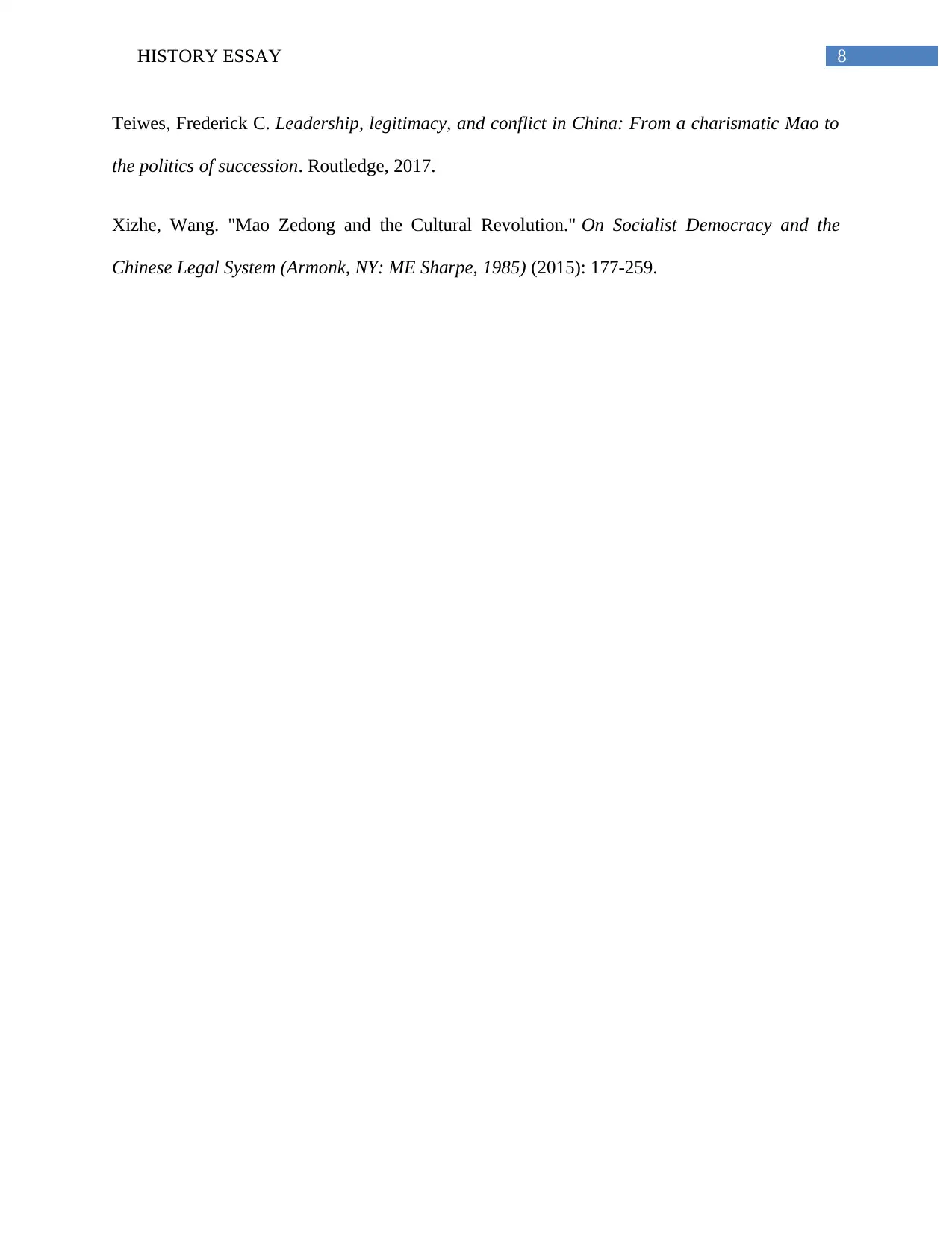
8HISTORY ESSAY
Teiwes, Frederick C. Leadership, legitimacy, and conflict in China: From a charismatic Mao to
the politics of succession. Routledge, 2017.
Xizhe, Wang. "Mao Zedong and the Cultural Revolution." On Socialist Democracy and the
Chinese Legal System (Armonk, NY: ME Sharpe, 1985) (2015): 177-259.
Teiwes, Frederick C. Leadership, legitimacy, and conflict in China: From a charismatic Mao to
the politics of succession. Routledge, 2017.
Xizhe, Wang. "Mao Zedong and the Cultural Revolution." On Socialist Democracy and the
Chinese Legal System (Armonk, NY: ME Sharpe, 1985) (2015): 177-259.
⊘ This is a preview!⊘
Do you want full access?
Subscribe today to unlock all pages.

Trusted by 1+ million students worldwide
1 out of 9
Related Documents
Your All-in-One AI-Powered Toolkit for Academic Success.
+13062052269
info@desklib.com
Available 24*7 on WhatsApp / Email
![[object Object]](/_next/static/media/star-bottom.7253800d.svg)
Unlock your academic potential
Copyright © 2020–2026 A2Z Services. All Rights Reserved. Developed and managed by ZUCOL.





